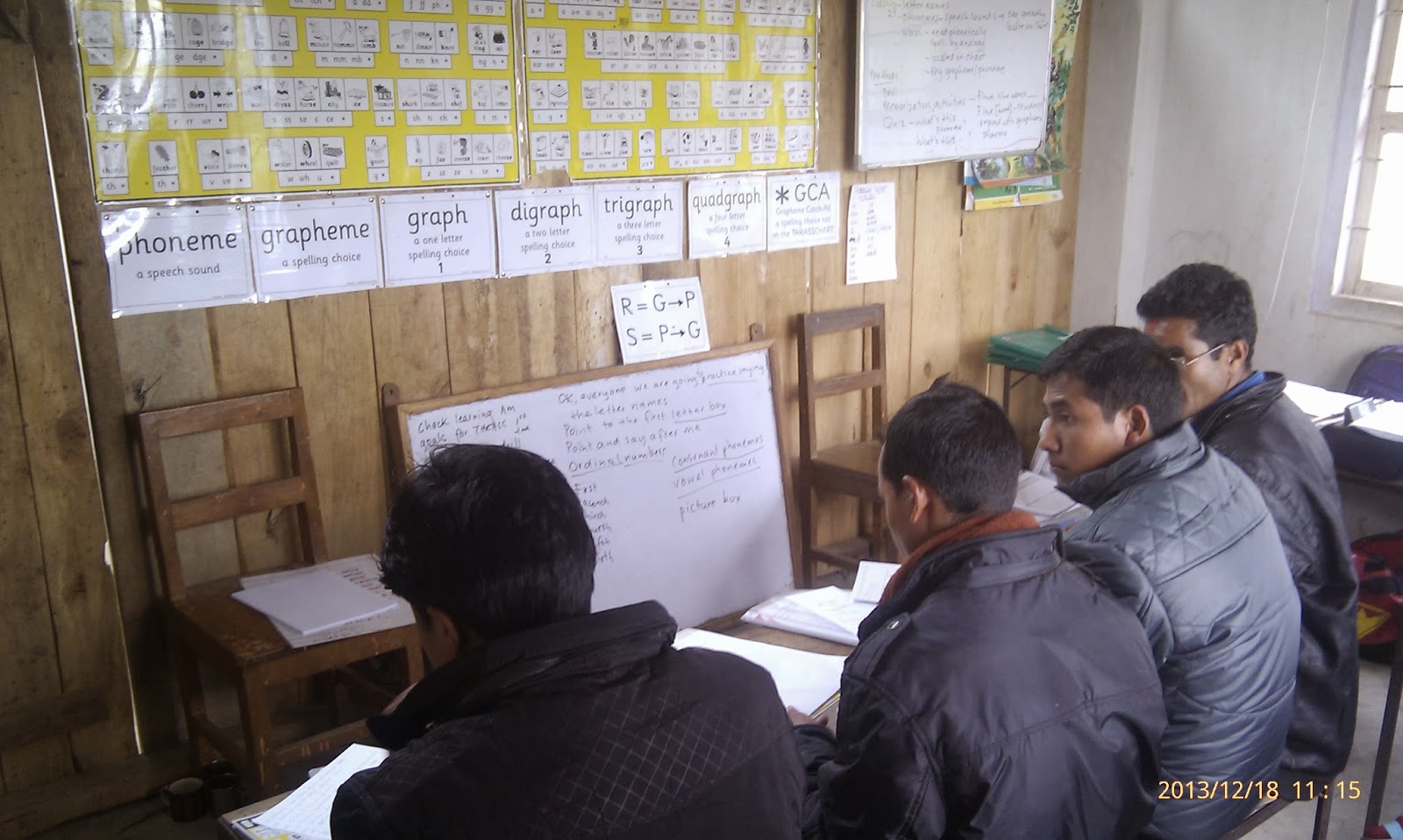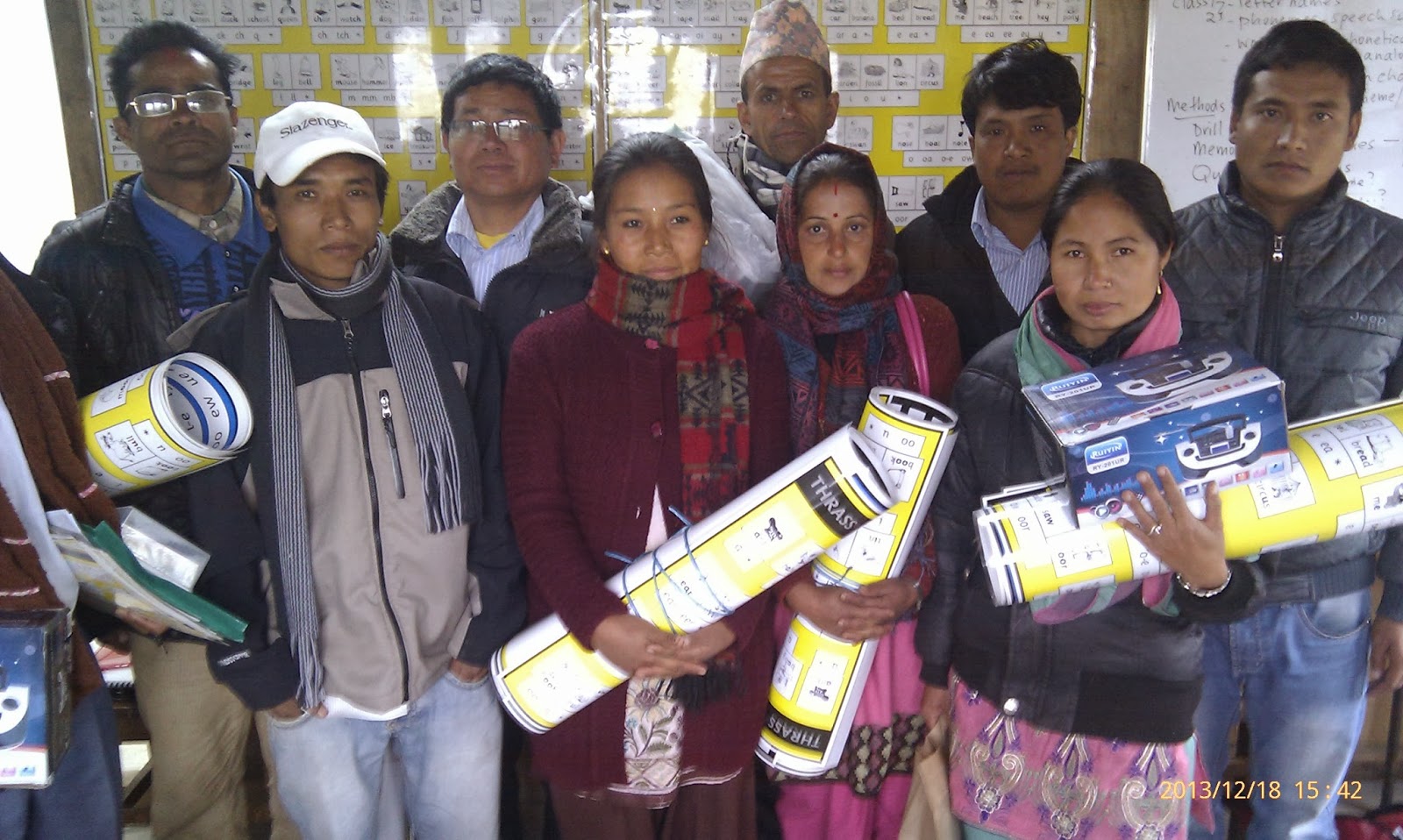 |
| Training Room at MLSS |
ECCA, Classrooms in the Clouds and I have
embarked on a new round of teacher training since the 2011/12 trials. After
much deliberation on the results of many needs assessments we decided to focus
our attention on the early years and build a sound phonemic foundation in
English pronunciation, reading and spelling skills. I chose the THRASS
methodology because I have been successfully using it with ESL students for a
number of years and its direct and explicit teaching approach was a perfect
match to the Nepalese approach of teacher directed learning. I felt that the
adoption of the new methodology might more be easily accepted if the approach
was a little bit familiar.
 |
| Teachers from Mirge Cluster of Primary Schools |
THRASS means ‘Teaching Handwriting, Reading
and Spelling Skills’ and these skills are based on phonetics. In Nepal, reading
has been taught using the ‘One Letter Makes One Sound Method’. Considering that
there are 44 sounds in English and 26 letters in the alphabet no wonder only a
small percentage of students have been successful in learning to read and spell
in English, which is one of the core subjects in the national Curriculum.
In addition, throughout the public system
poor teacher modelling of pronunciation has been a significant barrier to the
acquisition of good speech. To address this problem, the THRASS program
includes the use of a CD that not only helps consistently present excellent
modelling of the sound sequences for the students, but also is an invaluable
tool for teachers to use in improving their own pronunciation.
In all, six schools participated from the
cluster of primary, lower secondary and secondary schools. Our key School
Environment Improvement Program schools, Majhgaun, Kalidhunga and now Laliguran
English Boarding School participated and we welcomed new schools, Yarsa,
Janashramic, Kalidevi and Janashramadan to the training and joining our quest
to improve the quality of teaching and learning in Mirge. Twenty teachers,
including the Head teachers from each school who were present on the first day,
enthusiastically embraced not only new skills but a totally new way to look at
reading and spelling, namely the phonetic way.
Follow up trainings will be conducted over
the next two years to support the skill development of the teachers and explore
further effective implementation strategies for improving literacy.
However, to have a long term and
sustainable improvement in education in Mirge more is required than merely training
teachers in the use of more effective methodology, the teachers themselves need
to improve their own standard of English. I address this challenge we have
instigated a volunteer program and are ready now to accept volunteers to
conduct English language classes for teachers, which will be conducted from the
Majhgaun homestay library or at a more central point depending on participant
demand. Unfortunately attracting volunteers is difficult and a continuous
source of trainers is unreliable. Therefore, we have launched a new program to
train Nepal locals to act as trainers.
Train the Trainer, as it is commonly known
is the first step towards creating a more sustainable model of teacher
improvement. First a small group of committed English teachers will undertake a
self-directed pronunciation program in conjunction with a General English
Course. Mohesh Prakin and Phulkaji Tamang will coordinate the program and
maintain progress reports t me via email. This should take about one to two years
to compete if the teachers work at it consistently. After the trainers reach a
upper-intermediate or advanced standard they then can conduct English language
programs at their own schools or from a central point.
Overall, through implementing THRASS,
conducting refresher courses and training local trainers, we anticipate that
the improvement of teaching will be significantly evident within three years
and be reflected in the improvement of student attendance, enthusiasm,
examination results and both teacher and student confidence in using English in
communication.









